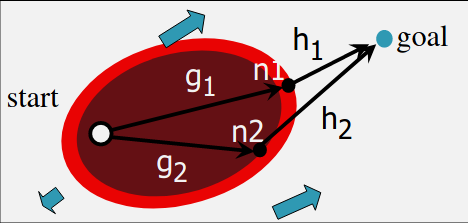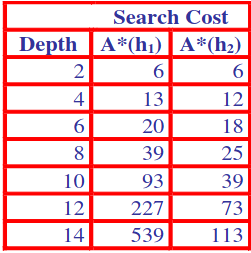22.03.08 - Heuristic Search
Also learnt about: Depth First Search Uniform Cost Search vs BFS
Blind Search vs. Heuristic Searches
Blind Search (DFS, BFS, UCS) Use same search just different queue - Blindly choose where to search in the search tree. But when problems get large, not practical any more
Heuristic Search
- Explore the next best node: more likely to lead to the goal state
- Using domain knowledge, so called informed search
- Heuristic function: Educated guesses, intuitive judgements on how close a node is to the goal.
A* Algorithm
Combines the cost so far and the estimated heuristic cost to the goal
- g - path cost from the initial state to current state
- h - heuristic cost from current state to a goal state
- f - an evaluation of the state: estimated cost of the cheapest solution through

h = 0 | A* becomes UCS, complete and optimal, but search undirected h too large thus dominates g | becomes greedy and lose optimality
How to estimate h
- Optimal and complete: if the heuristic is admissible
- Admissible: the heuristic must never over estimate the cost to reach the goal. h(n) a valid lower bound on cost to the goal
in the wrong position
sum of the distances from their goal position
Good Heuristics

- Admissible
- The closer the estimate of the heuristic to the actual cost, the better
Computerphile Video
A* - Small extension to djstraks which adds a heuristic to say how much closer were getting. Tells you how far have we got to go